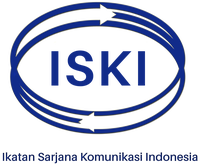- Focus and Scope
- Section Policies
- Peer Review Process
- Publication Frequency
- Open Access Policy
- Plagiarism Screening
- Publication Ethics and Malpractice Statement
Focus and Scope
Jurnal Ilmu Komunikasi focuses on writings that contain current research and thinking in the fields of:
- Communication Science, including media and journalism studies, audio and audiovisual broadcasting studies, public relations studies and advertising studies;
- Design of Visual Communication;
- Marketing Communications;
- Health Communication;
- Communication Psychology;
- Sociology of Communication;
Section Policies
Artikel
Peer Review Process
Publishers receive manuscripts that have never been published by other media.
Each incoming article selected by the Editorial Board is then reviewed by two reviewers/Mitra Bestari with a double-blind Peer Review. Articles that have been completed in the review are returned to the author for revision. The process is done one month (four weeks). The decision to publish, correct, or reject it based on recommendations from reviewers/Mitra Bestari.
Publication Frequency
Jurnal Ilmu Komunikasi published three times in April, August, and December.
Open Access Policy
Jurnal Ilmu Komunikasi (JIK) provides immediate open access to its published content. This policy is the principle of making research results freely and freely available to encourage the global exchange of knowledge to the public.
Plagiarism Screening
Every article that is submitted into this journal will be checked and screened for Plagiarism using a plagiarism checker.
Publication Ethics and Malpractice Statement
Based on REGULATION OF THE CHAIRMAN OF INDONESIAN SCIENCE INSTITUTION NUMBER 2/2014
The researcher's code of ethics is a moral reference for researchers in researching the development of science and technology for humanity. This is a form of dedication and social responsibility and devotion to God Almighty following the Regulation of the Head of LIPI Number 06/E/2013 concerning the Research Code of Ethics.
Researchers who are proven legally to have violated the ethics of researchers are dismissed from their positions as researchers. Provisions regarding violations of researcher ethics are further regulated through the Head of LIPI Regulation Number 06 / E / 2013 concerning Research Code of Ethics and Head of LIPI Regulation Number 08/E/2013 concerning Guidelines for Research Ethics Clearance and Scientific Publications.
The publication code of ethics statement is a statement of the code of ethics for all parties involved in the publication process in scientific journals, namely managers, editors, bestari partners, and writers. This scientific publication ethics code statement is based on the Committee on Publication Ethics which has been adopted in the Regulation of the Head of LIPI Number 5 of 2014 concerning the Code of Ethics for Scientific Publications. In essence, this Scientific Publication Code of Ethics is to uphold three ethical values in publications, namely (i) neutrality, which is free from conflicts of interest in publication management; (ii) justice, namely giving authorship rights to those entitled as writers; and (iii) honesty, which is free from duplication, fabrication, falsification, and plagiarism (DF2P) in publications.
Duties and Responsibilities of Journal Managers
- Determine the name of the journal, scientific scope, scale, and accreditation if needed.
- Determine editorial board membership.
- Defines the relationship between publishers, editors, peer partners, and other parties in a contract.
- Appreciate things that are confidential, whether for contributing researchers, authors/writers, editors, and bestari partners.
- Applying norms and provisions regarding intellectual property rights, especially copyright.
- Review journal policies and submit them to authors/authors, the editorial board, peer review partners, and readers.
- Generate behavioral code guides for the editor and peer-reviewed partners.
- Publish a journal regularly.
- Ensuring the availability of sources of funds for the sustainability of journal publishing.
- Build cooperation and marketing networks.
- Prepare licensing and other legality aspects.
Editor's Duties and Responsibilities
- Meeting the needs of readers and authors/writers,
- Strive to improve the quality of publications sustainably,
- Implementing processes to ensure the quality of published papers,
- Prioritizing freedom of opinion objectively,
- Maintain the integrity of the author's academic track record,
- Deliver corrections, clarifications, withdrawals, and apologies if needed,
- Responsible for the style and format of the written work, while the content and all statements in the written work are the responsibility of the author/writer,
- Actively soliciting the opinions of authors, readers, bestari partners, and members of the editorial board to improve the quality of publications,
- Encourage an assessment of the journal if there are findings,
- Support initiatives to reduce research and publication errors by asking authors to attach an Ethics Clearance form that has been approved by the Ethics Clearing Commission,
- Support initiatives to educate researchers about publication ethics,
- Assessing the effect of published policies on the attitudes of authors / authors and peer-reviewed partners and improving them to increase responsibility and minimize errors,
- Having an open mind to new opinions or views of others that may conflict with personal opinions,
- Not maintaining your own opinion, author, or the third party which may result in non-objective decisions,
- Encourage authors/writers, so that they can improve their written work so that it is fit for publication.
Duties and Responsibilities of Bestari Partners
- Received an assignment from the editor to review the paper and submit the results of the review to the editor, as material for determining the feasibility of a written work for publication.
- The reviewer must not conduct a review of written works that involve him, either directly or indirectly.
- Maintain the privacy of the author by not disseminating the results of corrections, suggestions, and recommendations by providing criticism, suggestions, input, and recommendations
- Encourage writers to make improvements to the paper
- Reviewing papers that have been corrected according to predetermined standards.
- Written works are reviewed on time according to the published environment based on scientific principles (data collection methods, author legality, conclusions, etc.).
Author's Duties and Responsibilities
- Ensuring that those included in the list of authors meet the criteria as authors.
- Collectively responsible for the work and content of the article includes methods, analysis, calculations, and details.
- State the origin of resources (including funding), either directly or indirectly.
- Explain the limitations of the study.
- Respond to comments made by bestari partners in a professional and timely manner.
- Inform the editor if he will retract his written work.
- Make a statement that the work submitted for publication is original, has not been published anywhere in any language, and is not in the process of being submitted to another publisher.










